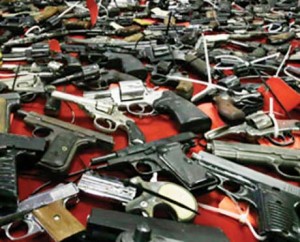by Joseph P. Tartaro | Executive Editor
 Cities are rethinking their gun buy-up programs after at least 30 years, finding them to be ineffective in reducing violent crime. Several cities are revisiting—and in some cases, revamping—those campaigns in the wake of recent mass shootings, Governing.com and its DC-based magazine, have reported.
Cities are rethinking their gun buy-up programs after at least 30 years, finding them to be ineffective in reducing violent crime. Several cities are revisiting—and in some cases, revamping—those campaigns in the wake of recent mass shootings, Governing.com and its DC-based magazine, have reported.
The events became so common across the country that public health researchers decided to test whether they actually reduced crime. Their conclusion? Not really.
Data seem to back up gun rights opposition to the events. Studies in Seattle and Sacramento in 1994 and 1998 suggested that the type of people selling their firearms—relatively few young men, for instance—didn’t resemble the general gun-owning population and weren’t likely to commit gun crimes. In Seattle, there appeared to be no statistically significant change in gun-related homicides after its gun buyback. A 2002 study in Milwaukee found that handguns sold back to local police didn’t fit the profile of handguns used in homicides. Buybacks, the studies seemed to say, don’t work.
As further evidence, Observer.com, the website of the weekly New York Observer, recently reported that New York City is discovering that “buybacks,” as they call them, aren’t working as intended.
Susan Herman, NYPD Deputy Commissioner for Collaborative Policing, recently told a crowd of anti-gunners that gun buybacks—a program long employed by New York police and politicians to exchange firearms for cash in hopes of preventing shootings—do little to reduce the number of weapons on city streets, observer.com reported.
Speaking at a gun policy event at Hunter College hosted by anti-gun US Rep. Carolyn Maloney (D-NY), Herman argued that buybacks tend to attract people crossing state lines in search of a quick buck, not city residents. Police Commissioner Bill Bratton appointed Herman, a criminal justice professor at Pace University, to help oversee Mayor Bill de Blasio’s new “neighborhood policing” program earlier this year.
“It has minimal impact,” she said. “Typically when we do gun buybacks, actually they’re often people from other states” coming to sell their guns. That’s a good thing, it’s good for America to get more guns off the street. It doesn’t particularly reap a lot of benefits here in New York,” she said.
Public Advocate Letitia James, whose former Brooklyn Council district has long suffered from outbreaks of gang violence, was quick to back up Herman’s assertions. She also said that, in her experience, the buybacks rake in weapons from financially strapped senior citizens.
As an alternative to periodic buybacks, Herman instead recommended outreach to mothers, sisters and grandmothers who know that a young man in their home has a gun, and encouraging an on-going open-door policy at the local precinct where they can turn over the weapon with no questions asked. She recommended that adults call the stationhouse to inform them they are en route with a firearm to surrender, and get the name of the officer to whom they speak.
Jean Shafiroff, the Manhattan philanthropist at the Hunter College event whose proposal for a holiday gun buyback prompted Herman’s remarks, told the Observer she remained undeterred in her idea. She said she hoped to roll out a novel program in Harlem this winter where residents could exchange their weapons for Christmas gifts.



